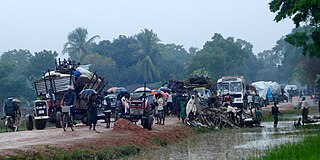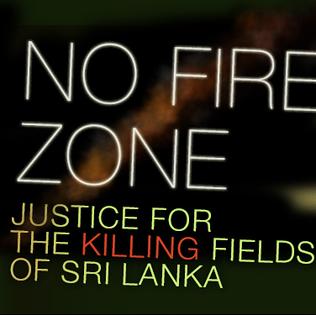Related Research Articles

An enforced disappearance is the secret abduction or imprisonment of a person with the support or acquiescence of a state followed by a refusal to acknowledge the person's fate or whereabouts with the intent of placing the victim outside the protection of the law. Often, forced disappearance implies murder whereby a victim is abducted, may be illegally detained, and is often tortured during interrogation, ultimately killed, and the body disposed of secretly. The party committing the murder has plausible deniability as there is no evidence of the victim's death.
Human rights in Sri Lanka provides for fundamental rights in the country. The Sri Lanka Constitution states that every person is entitled to freedom of thought, conscience and religion, including the freedom to have or to adopt a religion or belief of his choice. And, that every person is equal before the law.

Nandasena Gotabaya Rajapaksa, is a former Sri Lankan politician and military officer, who served as the eighth president of Sri Lanka from 18 November 2019 until his resignation on 14 July 2022. He previously served as Secretary to the Ministry of Defence and Urban Development from 2005 to 2015 under the administration of his elder brother former President Mahinda Rajapaksa, during the final phase of the Sri Lankan Civil War.
Tens of thousands of people have been disappeared in Sri Lanka since the 1980s. A 1999 study by the United Nations found that Sri Lanka had the second highest number of disappearances in the world and that 12,000 Sri Lankans had disappeared after being detained by the Sri Lankan security forces. A few years earlier the Sri Lankan government had estimated that 17,000 people had disappeared. In 2003 the Red Cross stated that it had received 20,000 complaints of disappearances during the Sri Lankan Civil War of which 9,000 had been resolved but the remaining 11,000 were still being investigated. Amnesty International reported in 2017 that the disappeared persons in Sri Lanka could be between 60,000 and 100,000 since the late 1980s.
The Sunday Leader was an English-language Sri Lankan weekly newspaper published by Leader Publications (Private) Limited. It was founded in 1994 and is published from Colombo. Its sister newspapers are the Iruresa (Irudina) and the defunct The Morning Leader. Founded by brothers Lasantha Wickrematunge and Lal Wickrematunge, the newspaper is known for its outspoken and controversial news coverage. The newspaper and its staff have been attacked and threatened several times and its founding editor Lasantha Wickrematunge was assassinated.

Lasantha Manilal Wickrematunge was a high-profile Sri Lankan journalist, politician, broadcaster and human rights activist who was assassinated in January 2009.
Prageeth Ekneligoda born April 9, 1960, is a Sri Lankan Cartoonist, Political analyst and Journalist. He was reported missing on January 24, 2010, two days before the Presidential polls in Sri Lanka when the country was under the Presidency of Mahinda Rajapaksa and has not been seen since. He actively participated in the presidential campaign of common opposition candidate Sarath Fonseka while working as a freelance journalist for a pro-opposition website Lankaenews.com. Members of his family believe he has been abducted by pro-government supporters because he was investigating the alleged use of chemical weapons, charges that were denied by the government of Sri Lanka. In 2009 Amnesty International released information regarding the circumstances surrounding his disappearance. Reporters without borders has issued a statement concerning him. The investigation into his disappearance is being led by the Colombo Crimes Division. He is married to human rights activist Sandya Eknaligoda who was given an International Women of Courage Award in 2017 for her campaigns. The International Federation of Journalists lists his case in its campaign "Without a Trace" amongst the top 10 cases of enforced disappearances of media workers which still remains untraced in Asia Pacific.
Shritharan Sivagnanam is a Sri Lankan Tamil school teacher and politician. He is the Member of Parliament for the Jaffna District and leader of the Illankai Tamil Arasu Kachchi.

Leena Manimekalai is an Indian filmmaker, poet and an actor. Her works include five published poetry anthologies and several films in genres, documentary, fiction and experimental poem films. She has been recognised with participation, mentions and best film awards in many international and national film festivals.

Sengadal is a 2011 Indian Tamil-language independent film written and directed by Leena Manimekalai, who makes her directing debut and stars in the film. Produced by Janaki Sivakumar, the film features cinematography by M. J. Radhakrishnan and editing by Sreekar Prasad. The film was initially banned by the regional centre of the Censor Board, but Appellate Tribunal authorities of the board at New Delhi cleared the film in July 2011 after legal struggle. Sengadal was part of the Indian Panorama at the 42nd International Film Festival of India after the censor board had cleared the film.

Lies Agreed Upon is a documentary produced by Sri Lanka Ministry of Defence in response to a documentary aired by Channel 4, named Sri Lanka's Killing Fields, about the final weeks of the Sri Lankan Civil War. The documentary gives the Sri Lanka Ministry of Defence response to war crimes accusations and rebuts points made by the producers of the Channel 4 documentary, who presented it as "a forensic investigation into the final weeks of the quarter-century-long civil war between the government of Sri Lanka and the secessionist rebels, the Tamil Tigers." Lies Agreed Upon was first aired at an official function held at Hilton Colombo on 1 August 2011, one and half months after the broadcasting of "Sri Lanka's Killing Fields". Ministry of Defence released another report named Humanitarian Operation – Factual Analysis : July 2006 – May 2009 on the same day.

The 2013 Commonwealth Heads of Government Meeting was the 23rd Meeting of the Heads of Government of the Commonwealth of Nations. It was held in Colombo, Sri Lanka, from 15 to 17 November 2013. Commonwealth leaders agreed on Sri Lanka as the 2013 host for the meeting when they met in Port of Spain, Trinidad and Tobago, in 2009. Sri Lanka, which was originally slated to host the summit in 2011, was accused of committing atrocities during the Sri Lankan civil war and the summit was instead held in Perth, Australia; Colombo was given the 2013 summit instead. The leaders of Canada, Mauritius, and India boycotted the summit, citing alleged human rights violations by Sri Lanka against its Tamil minority. Protests were also banned during the summit. President Mahinda Rajapaksa summarised the summit's events as: "Issues covered in the communique include development, political values, global threats, challenges and Commonwealth cooperation." However, the meeting was overshadowed by controversy over Sri Lanka's human rights record and the alleged war crimes during the final stages of the civil war. This was the first time in 40 years that the Head of the Commonwealth, Queen Elizabeth II, was not present at the CHOGM.

The Tamil genocide refers to the various systematic acts of physical violence and cultural destruction committed against the Tamil population in Sri Lanka during the Sinhala–Tamil ethnic conflict beginning in 1956, particularly during the Sri Lankan Civil War, as acts of genocide. Various commenters have accused the Sri Lankan state of responsibility for and complicity in a genocide of Tamils, and point to state-sponsored settler colonialism, state-backed pogroms, and mass killings, enforced disappearances and sexual violence by the security forces as examples of genocidal acts.

No Fire Zone: In the Killing Fields of Sri Lanka is an investigative documentary about the final weeks of the Sri Lankan Civil War. The documentary covers the period from September 2008 until the end of the war in 2009 in which thousands of Tamil people were killed by shelling and extrajudicial executions by the Sri Lankan Army including Balachandran Prabhakaran, the 12-year-old son of the slain Liberation Tigers of Tamil Eelam (LTTE) Chief Velupillai Prabhakaran. The Sri Lankan army has denied the allegations in the documentary. However, on 21 October 2015 the BBC reported that Maxwell Paranagama, a government-appointed Sri Lankan judge, says allegations the army committed war crimes during the long conflict with Tamil Tiger rebels are "credible". He went on to say there was evidence to suggest that footage obtained by the Channel 4 documentary No Fire Zone - showing prisoners naked, blindfolded, with arms tied and shot dead by soldiers - was genuine.

Jeyakumari Balendran is a Sri Lankan Tamil woman and an activist campaigning for the families of those who disappeared while in Sri Lankan military custody. Sri Lankan government forces currently have Ms Jeyakumari and her 13-year-old daughter Vipoosika in detention at an unknown location. They gained prominence during British Prime Minister David Cameron’s visit to Jaffna in November, when Vipoosika’s desperate pleas for the return of her missing brother gained widespread coverage. Civil society campaigners have expressed concern for the safety of mother and daughter.

Antonythasan Jesuthasan, also known by the pseudonym Shobasakthi, is a Sri Lankan Tamil author and actor.

Forced disappearance in Pakistan originated during the military rule of General Pervez Musharraf. The practice continued during subsequent governments. The term missing persons is sometimes used as a euphemism. According to Amina Masood Janjua, a human rights activist and chairperson of Defence of Human Rights Pakistan, there are more than 5,000 reported cases of forced disappearance in Pakistan. Human rights activists allege that the law enforcement agencies in Pakistan are responsible for the cases of forced disappearance in Pakistan. However, the law enforcement agencies in Pakistan deny this and insist that many of the missing persons have either joined militant organisations such as the TTP in Afghanistan and other conflict zones or they have fled to be an illegal immigrant in Europe and died en route.
Liyanage Don Leena Piyasili de Silva, popularly referred to as Leena de Silva, was a Sri Lankan actress who worked in Sri Lankan cinema, theatre and television. One of the earliest pillars of Sri Lankan cinema, de Silva contributed many critically-acclaimed films of her generation, with a career spanning more than six decades.
Sinnavan Stephan Sunthararaj was a child rights activist in Sri Lanka. He was the Project Manager of the Centre for Human Rights and Development and Coordinator for the Child Protection Unit of World Vision. He had reported on the pro government military Eelam People's Democratic Party's child prostitution racket in Malaysia and India with the help of corrupt of Customs and Immigration officials.
References
- ↑ "White Van Stories - reporting on Sri Lanka's disappeared". Channel 4. 14 September 2013. Retrieved 14 September 2015.
- ↑ "White Van Stories: Sri Lanka's 'disappeared' - video". Channel 4. 14 November 2013. Retrieved 14 September 2015.
- ↑ "White Van Stories To Air Across UK, US And Australia". Colombo Telegraph. 13 October 2013. Retrieved 14 September 2015.
- ↑ "Documentary Following the vanishing van". Nandini Ramnath. LiveMint. 12 April 2014. Retrieved 14 September 2015.
- ↑ "White Van Stories: a Film by Leena Manimekalai". .salem-news.com. 7 November 2013. Retrieved 14 September 2015.
- ↑ "Families of disappeared living slow death under state terror: Leena Manimekalai". Journalists for Democracy in Sri Lanka. Retrieved 14 September 2015.
- ↑ "Documentary on forced disappearances in Sri Lanka to be shown today". Fazeena Saleem. The Peninsula. 26 October 2014. Retrieved 14 September 2015.
- ↑ "Capturing Human Devastation". Shevlin Sebastian. New Indian Express. 5 March 2015. Archived from the original on 12 March 2015. Retrieved 14 September 2015.
- ↑ White Van's- Interview - Leena Manimekalai. channel4.com.